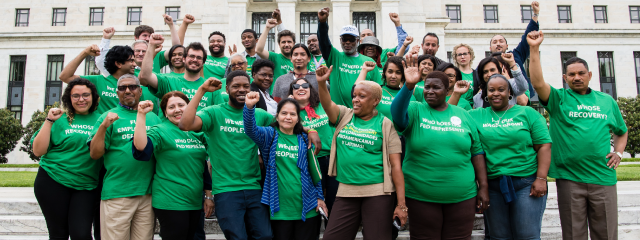Blog
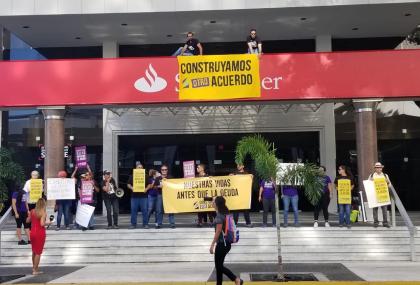
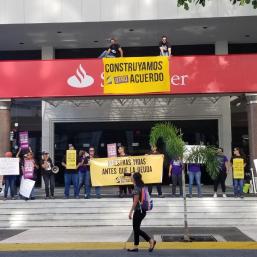
On April 24, Puerto Rican activists, CPD affiliates, and ally organizations took part in actions across several states and Puerto Rico to demand the cancellation of $6 billion in illegal debt owed by Puerto Rico to corporate entities. Even before Hurricane Maria made landfall in 2017, Puerto Rico was facing a fiscal crisis created by austerity measures that benefited a number of private corporate interests. That crisis was compounded in the aftermath of the hurricane by Wall Street banks capitalizing on Puerto Rico’s recovery efforts through predatory lending, in a violation of Puerto Rico’s constitution.
April’s actions were held as part of the #CanceltheDebt campaign, which seeks a just recovery for the island and works to ensure that no money is paid to bondholders and institutions that illegally profited from the Puerto Rico debt crisis. This year, the CPD Network participated in #CanceltheDebt actions in:
-
Allentown, PA and Hartford, CT: Make the Road PA and Make the Road CT held rallies in front of local Santander banks to protest the role that the bank played in financing illegal debt.
-
New York, NY: NYCC, CUFFH and Diaspora en Resistencia held a rally in front of the courthouse to demand that a federal judge take steps to cancel illegal debt.
-
Las Vegas, NV: Members of Make the Road NV sat down with members of Congress to talk about the #CanceltheDebt campaign.
-
Orlando, FL and Los Angeles, CA: Vamos4PR, Organize Florida, Alianza and other organizations in Florida and SoCal for Puerto Rico rallied in front of UBS banks in their areas to protest the role that the bank played in financing illegal debt.
-
San Juan, Puerto Rico: Construyamos Otro Acuerdo Coalition held a march in the financial district to protest the role that Banco Popular and Santander bank played in financing illegal debt.
On May 2, the federally appointed Financial Oversight and Management Board (FOMB) monitoring Puerto Rico’s financial recovery filed suit against a number of Wall Street banks that participated in predatory lending. As CPD organizer Jesus Gonzalez noted in a statement, this crucial step would not have been possible without sustained advocacy from Puerto Rican families and activists on the island and in the diaspora. And even in light of this recent lawsuit, Puerto Rico is still on a long road to a just recovery.
"While the FOMB has decided to pursue legal action," Gonzalez said, "there is much information we still need to analyze to ensure that proper action is taken against every single person who profited from the illegal debt."
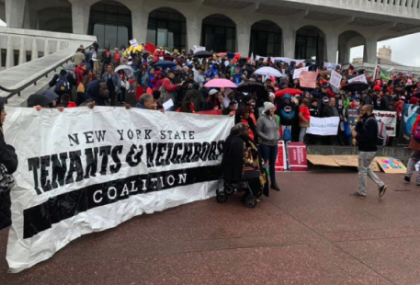
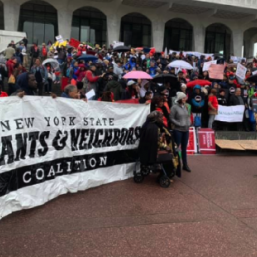
In partnership with the Upstate/Downstate Housing Alliance and other housing activists, Local Progress NY has been fighting for increased tenant protections and an end to evictions in the state of New York. Since February, members have written op-eds, joined a sign-on letter to the state legislature and Governor Andrew Cuomo, held town hall meetings , and passed resolutions in several jurisdictions intended to defend and expand renters’ rights.
This month, Local Progress NY participated in several actions to address New York’s ongoing housing crisis. On May 2, Local Progress member and Dutchess County legislator Francena Amparo partnered with the Upstate/Downstate Housing Alliance and local activists to host the first Renters’ Town Hall in Wappinger, NY, where dozens of concerned residents attended to discuss the conditions facing renters in Dutchess County.
On May 14, Local Progress NY members joined the Upstate/Downstate Housing Alliance and nearly 2,000 renters from all over the Empire State at the New York State Capitol to advocate for expansion of the Emergency Tenant Protection Act (ETPA) and the “Good Cause” Eviction bill. Local Progress members participated in a rally on the steps of the State Museum, then marched across the Empire State Plaza to the Capitol, where activists occupied state legislative offices and delivered petitions and postcards to state legislators and Governor Cuomo.
At the rally, Marion Porterfield, Schenectady city council member and co-vice chair of Local Progress NY, spoke on behalf of its membership and highlighted the work that our network has done in support of both bills. Also in attendance were Francena Amparo, who spoke about the Dutchess County Renters’ Town Hall; New York City council members Brad Lander, Ben Kallos, Carlina Rivera, Mark Levine, Speaker Corey Johnson, and NYC Comptroller Scott Stringer spoke in support of all nine tenants’ rights bills currently in front of the state legislature; and Ossining Village Trustees Quantel Bazemore and Omar Herrera led lobby visits with their constituents to their State Assembly members and senators.
Renter protection legislation is part of CPD’s Local Progress State Legislative Toolkit for 2019 and has generated more member engagement this year than any other campaign associated with the toolkit. As gentrification, rising rents, and evictions displace an increasing number of New Yorkers from their homes, Local Progress NY will continue to serve as an integral part of the coalition fighting for stronger renters’ protections statewide. Learn more about Local Progress NY and CPD’s housing justice work.
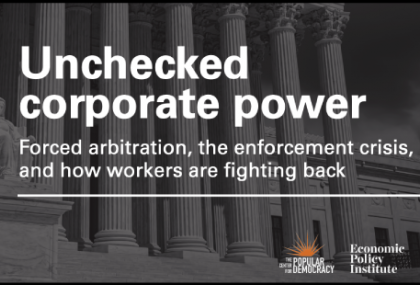
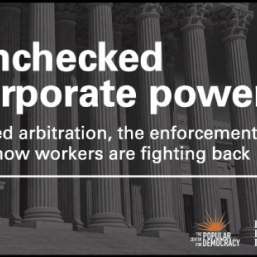
On May 21, 2019, CPD released a new report in partnership with the Economic Policy Institute (EPI), "Unchecked Corporate Power: Forced arbitration, the enforcement crisis, and how workers are fighting back.” The report highlights the important work that Make the Road NY, Working Washington, PCUN, Maine People's Alliance, Rights & Democracy, and other groups are leading to win new workplace protections and fight forced arbitration. Forced arbitration—or clauses in employment contracts that require workers to waive their right to sue their employer or participate in class-action litigation—is a serious threat to our gains on minimum wage, earned sick leave, fair workweek laws, and other core guarantees including anti-discrimination measures.
The report release date marked the one-year anniversary of the Supreme Court’s ruling on Epic Systems Corp. v. Lewis, which upheld the legality of forced arbitration. In the report, CPD and EPI assess that decision’s disastrous impact on working families and predict that by 2024, more than 80 percent of private-sector, nonunion workers will be blocked from court by forced arbitration clauses with class-action waivers. Without legal recourse, virtually all workers will have to rely on underfunded public worker-protection agencies to enforce their workplace rights. Our report includes new data showing that the resources and staffing of labor departments have shrunk at the federal level and in six states, even as the workforce has grown.
Although workers from tech companies including Google, Uber and Lyft have succeeded in pressing their employers to roll back some of their forced arbitration policies, the resulting company-by-company changes are extremely limited. To effectively and permanently restore the rights of millions of workers affected by forced arbitration, our report recommends two pieces of federal legislation, the Restoring Justice for Workers Act—which would overturn the Epic Systems ruling—and the Forced Arbitration Injustice Repeal (FAIR) Act, which would make forced arbitration clauses unenforceable. The report further details a whistleblower enforcement model that would authorize workers at the state level to initiate actions for violations of labor law and help public enforcement agencies partner with workers and community organizations.
Read or download the full report and read extended coverage of the report in CityLab, featuring Brenda Rojas, a PCUN member and first-generation college student in Salem, Oregon.
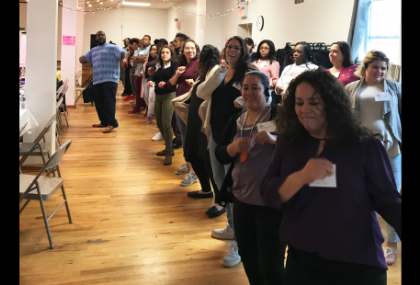
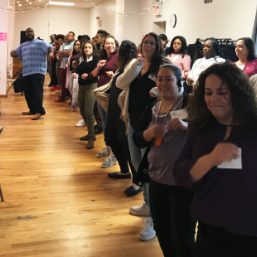
From May 13-15, 35 new organizers representing 16 CPD affiliates from across the US and Puerto Rico gathered in Brooklyn’s Mayday Space for a three-day new organizer training. The training, designed to support emerging base-building organizers with fewer than two years of experience in the field, was led by members of CPD’s base-building team from New York City and Detroit.
The training covered a number of key organizing fundamentals and tactics, ranging from ideology and organizer’s math to leadership development and healing justice. The training also addressed many of the shared challenges faced by new organizers while foregrounding solidarity, hope, and collaboration.
“As a new organizer, this training helped me to learn about some very important concepts, tactics, and habits that will help to ground me in the work,” said participant Lisa De Paoli of the Center for Coalfield Justice in Pennsylvania. “I’ve learned that some of the difficulties that I am having aren’t uncommon. I really welcome the sense of camaraderie that I feel here and the hope to continue.”
Using roleplays, case study discussions, community-building circles, and other methods, the training sought to center reflection and practice, and served as both a laboratory and sanctuary for participants to practice the skills essential for developing effective base-building programs. While observing a simulated organizer’s lab during a visit to the training, CPD Co-Executive Director Ana Maria Archila said, “This is where we become a network.” Participant Steven Merrick of Maryland Communities United echoed that sentiment and highlighted the peer relationships that developed during the three-day training.
“I have gained a vast amount of knowledge that I can take back and teach others,” he said. “My favorite part of this training is the relationships that I built with other participants. I didn’t expect to learn love during this training.”
CPD affiliates and other organizers will convene in July at the People’s Convention in Detroit and at CPD CAMP in November. We hope to see you there!
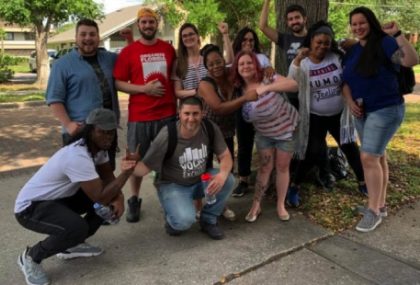
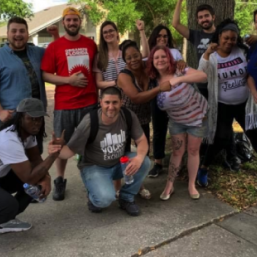
Earlier this May in Orlando, Florida, CPD’s Sustainability Team conducted its tri-annual canvass director training, an intensive, week-long program designed to help CPD affiliates develop the skills and strategies necessary to run effective canvassing offices and build dues-paying membership canvass drives.
Canvass directors from CPD affiliates Organize Florida, New Florida Majority, VOCAL-NY, Working Washington, Good Jobs Now, and One Pennsylvania received in-depth training on management practices, messaging skills, recruitment techniques, and statistical analysis. CPD Co-Executive Director Jennifer Epps-Addison flew in to speak personally with the canvass directors and led a discussion on the critical role of canvassing in the CPD Network’s base-building strategy over the next five years. Directors also developed models for engaging and retaining members in collaboration with Membership Drive, and participated in door canvassing to sign up new members with Organize Florida. At the end, the directors joined the Organize Florida team at a letter-drop action at Florida Senator David Simmons’ office to rally around the bills currently in legislative session.
CPD’s canvass programs are designed to generate significant revenue for participating partners and dramatically increase organization membership over the coming years. Learn more about the CPD Network’s door-to-door and street canvassing efforts.
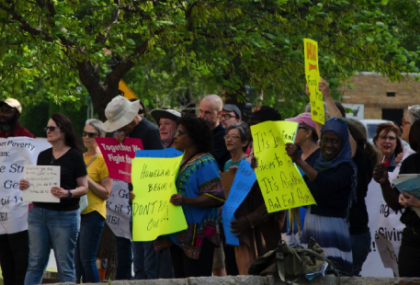
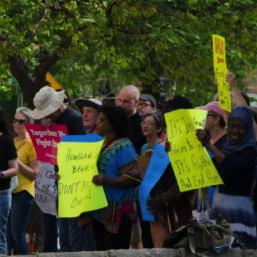
For years, the members and staff of Arkansas Community Organizations (ACO) have helped tenants in Arkansas win much-needed repairs and improvements to their rented homes and apartment complexes. Yet, despite these services, ACO realized they were pushing a rock up a hill only to have it roll back down again: While nearly one third of all Arkansans rent their homes (and those numbers are growing), the state still does not have a minimum standard of habitability for rental units and landlords are not required to maintain their properties. Worse still for mistreated tenants, nonpayment of rent is a criminal offense in Arkansas.
ACO realized they needed to fight hard to change Arkansas's lopsided landlord-tenant laws. Members began meeting with attorneys at nonprofit legal organizations in the state to develop an organizing and litigation strategy for reforming the state's renter laws, and over the last several years, ACO and Arkansas tenants have won several important victories.
In 2015, the city of Little Rock tried to close down an apartment complex over the holidays, giving tenants just one week to move. ACO had contacts at the complex and quickly organized a group of tenants who ultimately stopped the city's eviction order. The judge overseeing the case eventually ruled that because Little Rock has housing codes, there also exists an implied warranty of habitability for all rental property in the city.
In the summer of 2018, ACO started Arkansas Renters United (ARU) in an effort to build a statewide organization that could match the power of the Arkansas Realtors Association, a group that has defeated every attempt to reform Arkansas’s landlord-tenant laws. Lacking the financial capacity to hire organizers, ACO formed a closed Facebook group that members could share with friends around the state. The strategy worked—the group grew quickly, and members planned and participated in several actions, including making over 200 calls to the governor's office as part of a coordinated call-in during December 2018.
Valencia White, mother of two, and a renter in Little Rock, says she and the other members of the ARU are ready to continue the battle.
“It’s OK to just sit there and live in squalor? It’s a luxury to have a house that won’t fall in on you?” she asked. “I’m in the fight. We’re fighting together.”
The potential for this campaign to grow and build transformational people power in Arkansas is enormous, but social media alone cannot build the grassroots revolution needed to win stronger tenant protections in the state. For this reason, ACO has launched a national fundraising drive in order to hire two organizers who can lead campaigns across the state to keep the pressure on local property managers and realtors and bring real change to people in Arkansas. They ask for you to get involved in two ways: 1) stand in solidarity with their members by making a financial contribution here, and 2) reach out to ACO Executive Director, Neil Sealy, if you are aware of skilled organizers who are ready to take on this fight in Arkansas. Neil can be reached at nsealy@arkansascomm.org.
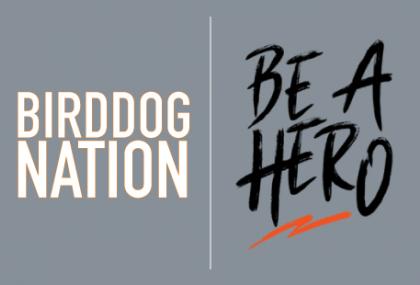
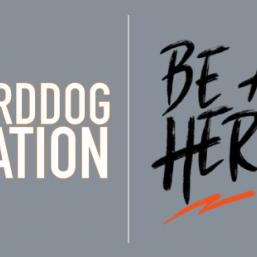
In early 2017, a national network of thousands of birddoggers—people who put sustained public pressure on elected officials to take action—came together to help defeat the repeal of the Affordable Care Act. Two years and 170+ birddog trainings later, Birddog Nation has won scores of important commitments from their local electeds to support a healthcare system that guarantees high-quality, low-cost health coverage for everyone and brings an end to the terrible HIV pandemic.
If you are interested in participating in this work, Birddog Nation invites you to join their weekly calls on Tuesdays at 8:30pm ET. The call-in number is 1-669-900-6833, with meeting room code 2510128015.
League of Heroes is a community of citizen activists fighting to save our democracy. It began in 2017 when activist Ady Barkan confronted then-U.S. Senator Jeff Flake (AZ), asking him to be a hero and vote to save healthcare benefits for millions of Americans. Instead, Congress chose to put Medicare and other programs at risk so it could cut taxes for corporations and the wealthiest families in America. Now we need you to help continue the fight. Will you be a hero by joining us to defend our democracy and fight for working people?
League of Heroes’ weekly calls take place on Thursdays at 8pm ET. The call-in number is 1-669-900-6833, with meeting room code 2510128015.
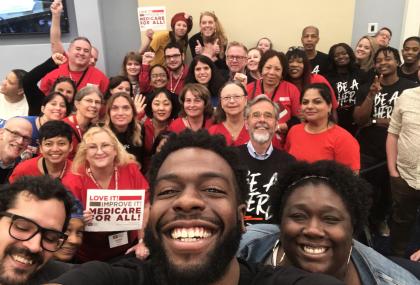
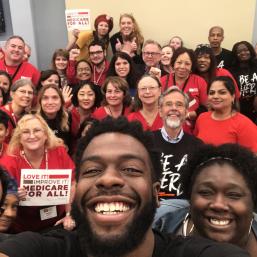
After months of actions organized by CPD affiliates and allies, congressional conservatives failed to take healthcare from millions of Americans in 2017, marking a crucial step for working families across the country. And still, for the tens of thousands of community members that make up the CPD Network, the Affordable Care Act (ACA) was never a path toward affordable, accessible healthcare. Many families are still struggling to afford basic necessities, and are having to choose between food on their tables and the medications they need to save their lives. For this reason, the CPD Network made the decision to endorse and push for Medicare for All in 2019.
On Monday, April 29, hundreds of CPD affiliate members and allies, and members of the Birddog Nation, a group of hundreds of activists trained to observe and seek out their elected officials to hold them publicly accountable, traveled to Washington, DC to rally in front of big PhRMA headquarters. On Tuesday, April 30, Ady Barkan, Senior Campaigner at CPD, testified at the historic, first-ever congressional hearing on Medicare for All in Washington, DC. You can read his full testimony here and watch the full hearing here, or by clicking on the image below. Just after the hearing, it was announced that Medicare for All would have a hearing in the House Ways and Means committee, the first major committee of jurisdiction for legislation!
Earlier this year, CPD affiliates and allies worked alongside Representatives Pramila Jayapal and John Dingell to draft and introduce a bill to Congress in April. That very bill is now being championed by many progressive elected officials like Representative Alexandria Ocasio-Cortez and Senator Bernie Sanders, who has introduced his own bill in the Senate. The Medicare For All Act is a landmark comprehensive bill that would ensure all Americans would be covered and would eliminate copays, deductibles, and out-of-pocket expenses.
Since its release, 16 senators have cosponsored the bill, including presidential hopefuls Kamala Harris and Elizabeth Warren. CPD affiliates DelACA, SPACES, Maryland Communities United, Rights and Democracy VT and NH, and members of the Birddog Nation, have shared sustained presence on Capitol Hill since January 2019, hitting the halls for lobby meetings and actions to gain more cosponsors for the bill.
We've come so far, but still have much work to do. If you are interested in getting involved in the fight for Medicare for All, reach out to CPD National Organizer, Darius Gordon at dgordon@populardemocracy.org or follow him on Instagram and Twitter.
Of course, this work would not be possible without the generous financial support from people like you. A problem that affects us all demands a solution that includes us all. We will not leave anyone behind. Healthcare is a human right and we need you in the fight. Make a donation today.
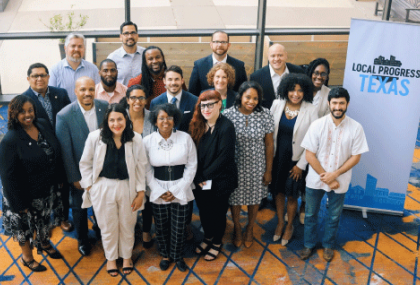
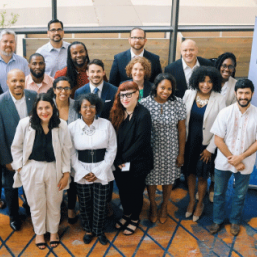
From April 4-6, Local Progress held its first Texas convening in Austin, bringing together more than 80 local elected officials and community and labor partners to learn, strategize, and build progressive power in the state and beyonD.
The convening came at an urgent time for local governments and communities in the state, as the Texas legislature is poised to wage attacks on local democracy through state prohibitions on local policy and revenue raising. To respond to this, Local Progress kicked off the convening with a lobby day and press conference at the state capitol, urging state lawmakers to uphold local democracy. You can read a great piece in the Texas Observer about these efforts to stop state interference.
Throughout the weekend, local elected officials and allies focused on strategizing and learning about topics like transformative public safety, protecting immigrant residents, affordable housing, school finance, environmental justice, and much more. Local Progress also held several interactive training sessions on governing strategies, expanding gender equity policy, and improving communications, and digital media strategy.
Texas is facing many challenges and undoubtedly will face more in the months and years to come. But Local Progress has built a powerful foundation of local leaders committed to making their state a place where everyone can thrive, no matter what you look like or where you come from. Learn more about Local Progress here.
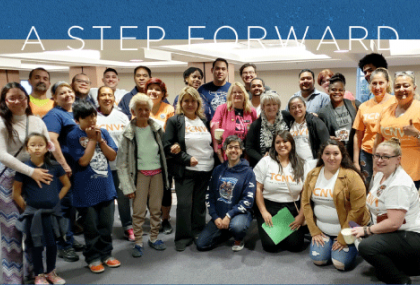
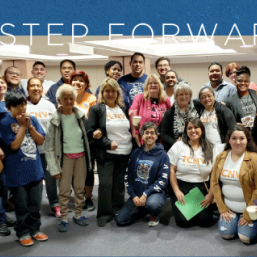
On Thursday, April 11, working Nevadans, families, and small business owners came together in front of the state’s Senate Commerce and Labor committee to testify and advocate for the earned paid sick days bill, SB312. With this senate bill, Nevadans would have the right to earn paid sick days and finally be able to put their health and the health of their families first. More than 430,000 children in Nevada live in families in which all parents work, yet too often parents cannot use the sick days they earn to care for their children.
At the committee hearing, Make the Road NV (MRNV) organizers Bianca Balderas and Jose Macias shared stories of their own family members being affected by the inability to earn paid time off to take care of themselves when they fell ill. Jose lost his mother because she couldn’t afford to put her health first. Like most working families, she needed to support her family and ignored all the warning signs of the stroke she had while working, and later passed away as a tragic consequence. Families are unknowingly risking their own lives going to work to provide for their families.
Individuals, working families, and small businesses understand the need for earned paid days, and with no opposition, the Nevada Senate Commerce and Labor Committee voted the paid sick days bill out of committee unanimously at the end of the hearing! The bill now moves to the senate floor to be heard again with new amendments being written into the bill that will hopefully expand to cover even more of Nevada’s workforce.
MRNV, as part of the statewide Time to Care NV coalition made up of 24 organizations, will continue to lift the voices of working families and urge elected officials to support SB312 when it gets introduced again later this year. We invite you to get involved by signing up here to share your own story, be notified of the next bus trip to Nevada’s state capitol, or join MRNV at a hearing in Las Vegas.



